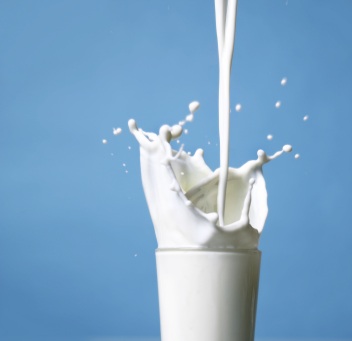Milk: Raw and Uncut
Filed under: General Health, Nutrition
This whole week I am going to put a lot of focus on one of the most controversial topics in the nutrition community: milk and dairy products. Should we consume it at all? Is organic better? Raw or pasteurized? Homegenized or no? There are a ton of questions about dairy, and I am going to provide a lot of info, hopefully answering some questions (though not all, since they can’t all be) and coming to a comfortable resolution. This isn’t really going to be about the nutrients in milk and dairy, just the production and processing of it.

I have always been a big dairy consumer. I was raised on copious amounts of skim milk, non-organic, completely industrialized skim milk and I loved every minute of it. Be honest, who doesn’t still love the idea of a PB & J with a huge glass of milk? Through my evolution in this industry, and the learning process that I am continually undergoing, you read more, you learn more, and you question more. Throughout my college years and a little thereafter I didn’t believe any of the negative info about conventional dairy. Mainstream nutrition experts, the FDA, the ADA, and my professors all brushed any negative info aside, declaring dairy to be A-ok. The only people that seemed to be against it were the hippies. Come to find out, the hippies were right.
Reading The Omnivore’s Dilemma is an eye-opening experience to the scary process we call industrial food production. Unfortunately, it doesn’t produce real food, just items resembling and pretending to be real food. Conventional dairy farms are no exception, seeking to maximize production and minimize cost (makes sense from a pure business perspective, except it destroys the product) are huge, milk the cows nearly non-stop, feed them boatloads of corn to maximize milk yield, may inject hormones to do the same, smash them full of antibiotics to counteract the corn feeding which sickens the animals, and generally doesn’t give two shits about the actual quality of their product, just the quantity. It is a cyclical nightmare, and the biggest companies are the worst offenders (this same statement applies even to organic dairies).

One step in the right direction is organic milk. In order to be certified organic, the cows have to have access to pasture (which doesn’t really mean much), fed organic feed, no hormones, no antibiotics, get milked less, and generally live in more sanitary conditions with more room and better care. If you can find organic milk from a small, preferably local dairy, it is most likely even pastured/grass-fed cows producing the milk, which is even better, and for what is widely available, probably your best option. Huge organic companies, like Horizon, do not meet those requirements though. They are simply industrial organic, bending the rules but not necessarily breaking them, pushing their limits and generally not producing a better product than conventional milk. Last week I actually came across a fantastic resource on organic dairies, milk, cheese, yogurt, etc, that gave them scores based on surveys. It was quite revealing and I suggest you all check it out here. The good news is there are some great companies out there producing good products. If you are afraid of raw milk, and want the best “normal milk” that is widely available, Organic Valley makes some pretty good products and got pretty good ratings in that report.
The deeper you get into how your food was produced, the more you realize that there is a lot of shit you no longer want to eat. Conventional food production no longer seems remotely appealing, large organic corporations are not much better, their only real benefit being that at least they don’t contribute to our pesticide/herbicide/antiobiotic/hormone issues. I haven’t even gotten into the issues around pasteurization, ultra-pasteurization, homogenization, etc. This is a huge issue that I could never cover in its entirety in a few blogs, whole books have been written about it! I just hope to at least give some solid info on the topic and help people make better food choices. To Be Continued…
Check out the BSP Training & Nutrition Newsletter!
You will get immediate access to:
- Weekly updates and exclusive content.
- The 20-page report "The Truth About Saturated Fat & Cholesterol."
- Become more awesome!
Posted on March 31st, 2009 by Brian St. Pierre
4 Comments




March 31st, 2009 at 9:57 pm
This should be a series of very interesting posts, Brian, so I look forward to reading them. I had not been consuming any dairy at all for a few years but recently started to add some Greek Yogurt back into the mix. Plus I know you’ve touted cottage cheese in the past, so it should be very educational reading what you have to share on the dairy front.
Thanks for being another great resource out there and sharing your knowledge.
April 2nd, 2009 at 12:34 pm
I agree with Jack – thanks for sharing your knowledge! I recently made the switch to organic milk, but Horizon is the only brand I’ve found so far.
I’m curious about other dairy products. I eat mozzarella cheese sticks, ricotta, and cottage cheese regularly. I don’t usually eat yogurt because even the plain stuff is loaded with sugar.
April 3rd, 2009 at 2:33 pm
Bob,
Look into Greek yogurt, or Icelandic. Much lower in sugar and much higher in protein and healthy probiotics. Oikos is a great one. It is made my Stonyfield, which got high reviews for its yogurt on that report.
Jack,
Thanks for the kind words.
July 31st, 2012 at 8:52 pm
car rental discount codes california san jose